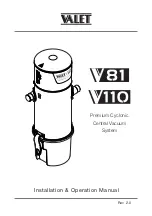
FLB Service Instructions
92
Q
Engine Air Cleaners, Accessories & Service Parts
Heavy Dust Conditions
1
Remove the old
filter gently
“Baby” that dirty
filter, until you get it
clear of the housing.
Accidentally bump-
ing it while still inside
means dropped dirt
and dust that will
contaminate the
clean side of your
filter housing, before the new filter
element has a chance to do its job.
2
Always clean the inside of
the housing carefully
Dirt left in the air cleaner housing
spells death for your
engine. Use a clean,
damp cloth to wipe
every surface clean.
Check it visually to
make sure it's clean
before putting in a
new filter.
3
Always clean the gasket
sealing surfaces
An improper gasket seal is one of
the most common
causes of engine
contamination.
Make sure that all
hardened dirt ridges
are completely
removed, both on
the bottom and top
of the air cleaner housing.
4
Check for uneven
dirt patterns
Your old filter has
valuable clues
to dust leakage
or gasket sealing
problems. A
pattern on the
filter clean side
is a sign that the old filter was not
firmly sealed or that a dust leak
exists. Identify the cause of that
leak and rectify it before installing a
new filter.
5
Press your fresh gasket to
see that it springs back
Make sure your new filter is made
with a highly com-
pressible gasket that
springs back
(promptly) when fin-
ger pressure is
released. A high
quality gasket is one of the most
important parts of the filter.
6
Make sure the
gasket seats evenly
If you don’t feel the gasket seating
evenly for a perfect seal, you don’t
have protection.
Re-check to see if
the sealing surface
in the housing is
clean, and ensure
that the filter is the
correct model. It
may be the wrong
size for the housing.
7
Ensure air-tight fit on all
connections and ducts
Check that all clamps and flange
joints are tight, as well as the air
cleaner mounting bolts. Seal any
leaks immediately - leaks mean dirt
is directly entering your engine.





































